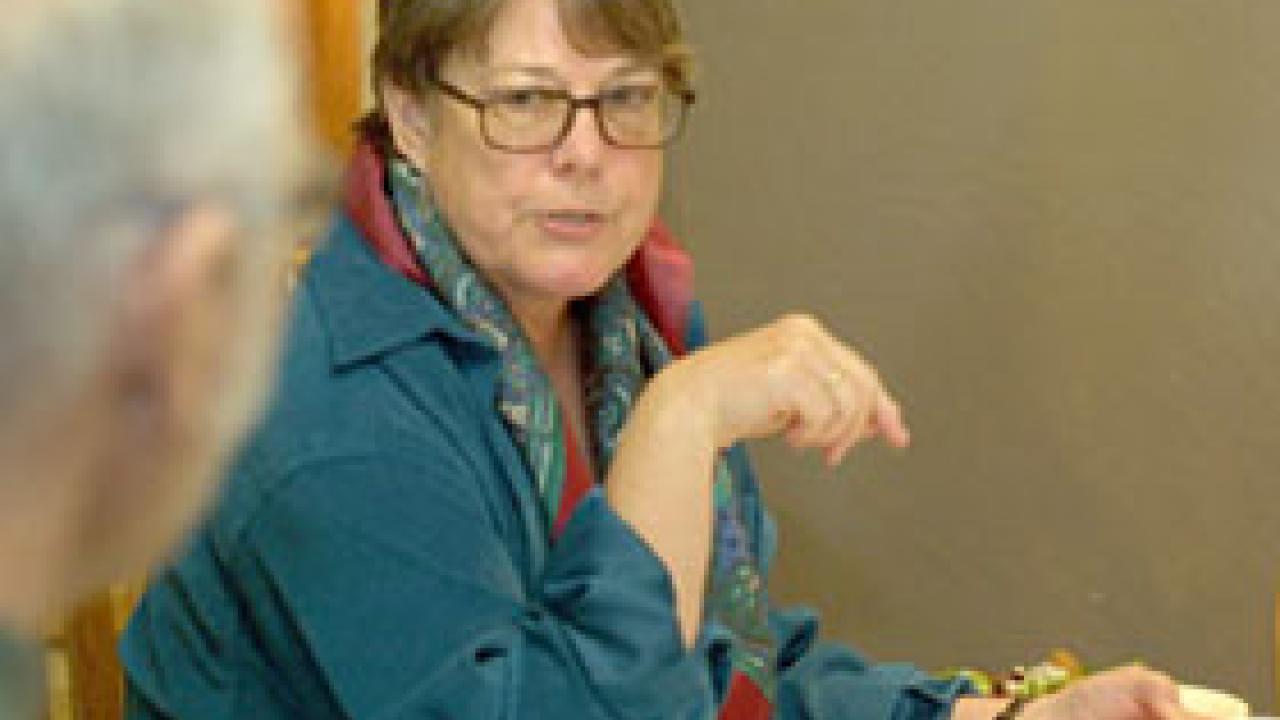Africa -- the land of mystery and beauty -- is a hot subject these days.
Today's adventurers are not found so much on savannahs or in leafy jungles, but in the corridors of America's universities. At UC Davis, a growing number of scholars and students are taking a deep look at Africa -- a place challenged by public health issues such as AIDS and malnutrition as well as the instability of political governments.
Cynthia Brantley, a professor of history at UC Davis, has examined the comparative details of African village nutritional conditions, as well as the specifics of British colonial scientific nutrition projects. Her book, Feeding Families: African Realities and British Ideas of Nutrition and Development in Early Colonial Africa (2002), details some of these findings.
On Feb. 12, Brantley spoke about African history to campus scholars at Soga's Restaurant in Davis. Dubbed informally as the Committee of Africanists at UC Davis, the group has been spurred to meet regularly by professor of anthropology Donald Donham, who came to UC Davis this year from a highly acclaimed African Studies program at Emory University. This quarter, Benjamin Lawrance, a new assistant professor who teaches African history, is also helping organize the events along with Brantley.
Lawrance says the Africanists are working closely with faculty from African-American and African studies and arranging events for the public and students to learn more about the continent.
"Our goal is to create a vibrant and viable Africanist community on campus, where scholars from all disciplines can meet and share their work," said Lawrance, noting that a good model is UCLA's African studies center, the largest in the country. "A lot of people in different disciplines are interested in studying Africa."
Lawrance says this effort is part of a larger trend nationwide to develop and expand African studies programs.
Students are also taking an interest in Africa, especially in studying abroad there. In 1990, only 1.3 percent of the 71,000 U.S. students who studied abroad went to Africa; by 2001, that figure rose to 3 percent of the total, which had grown to 154,000, according to the New York Times.
UC Davis offers an African-American and African Studies program in the Department of Ethnic and Cultural Studies. An interdisciplinary field of study in the humanities, arts and social sciences, the curriculum emphasizes courses on the African-American experience in the United States and the African diasporic experience.
Lawrance knows of at least seven graduate students at UC Davis who are studying Africa. There may be many more, he added, noting that the history department plans to accept its first doctoral students in African studies in the year ahead.
Language is the biggest challenge for those studying Africa, he noted. Africa is home to hundreds of languages, and there are simply not many courses on them in the United States. Students often have to study African languages elsewhere, usually during the summers.
For Lawrance, Africa is a source of amazement that draws out the best in scholars and students and offers them a view about history that is not so Euro-centric. "There's a sense of goodwill at the root of many of the people who are involved in these classes and programs," he said. "It's also an opportunity to understand human history from beyond the traditional lens of Western-focused scholarship."
The group plans to hold another session on March 15. Mariane Ferme, the UC Berkeley director of African studies, will speak at 4 p.m. in the Andrews Conference Room 2203, Social Sciences and Humanities Building.
During her talk on African nutritional conditions last week, Brantley said, "We are deepening our knowledge of Africa's past and present and helping our students understand Africa's many challenges and achievements. Moreover, our members are committed to helping Africa find solutions to its problems, and many of us -- as scholars, activists, and practitioners -- are directly engaged in the search for solutions."
Brantley's work, for example, shows that investigators launched a nutritional development program before the team's own findings were assessed. The study she examined was "ultimately marred by the fact that it became basically two separate studies: a scientific one and a sociological one."
African women were deeply involved growing, processing, cooking and serving family meals, she said. "So often, the seasonality of their work presented serious challenges to their task of feeding their families."
Brantley said African women typically had to master a complex process of harvesting, storing and distributing the food. "In short, most African communities relied on women to cook at least one meal a day for their families."
She said that the preconceived notion that some African communities have fed themselves improperly might have been dispelled by better data collection and sociological interpretations.
